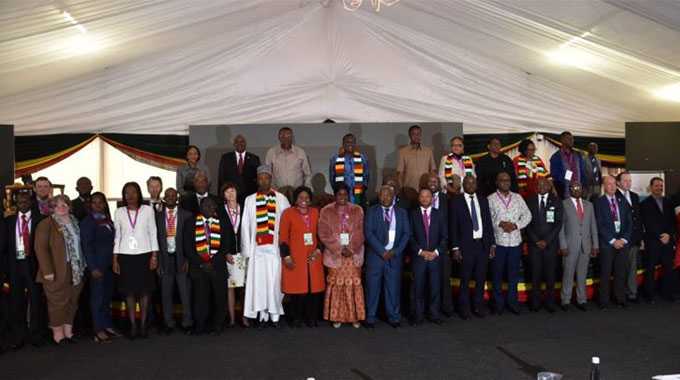Civil servants’ demands should be reasonable

Nobleman Runyanga, Correspondent
Although civil servants play a critical role in the provision of essential services by Government ministries and departments and are entitled to the right to fight for the improvement of their salaries and working conditions, some of their demands appear out of season with the reality on the ground.
This article seeks to discuss some of the issues as they have unfolded since last year.
Junior medical doctors
For the whole of December last year junior doctors downed stethoscopes demanding a number of things such as an improvement in medical supplies and drugs in hospitals and being paid in United States dollars.
Government met 80 percent of the demands except for the United States dollar salary payments but the doctors insisted on continuing their work stoppage causing the strike to spill into January.
They later relented ending the then six-week strike but not without the country and many families losing their loved ones whose lives could have been saved.
School teachers
For months now teachers under various unions have been restive and threatening to strike. Just before schools opened on January 8 teachers’ union leaders threatened that the schools would not open as their members would down tools to protest against Government over their salaries which, they argued, were inadequate in comparison with the high cost of living.
Thankfully, reason prevailed and the schools opened without incident.
During the last school holiday a handful of teachers under the Obert Masaraure-led Amalgamated Rural Teachers’ Union of Zimbabwe (ARTUZ) walked the 265km-long Mutare to Harare distance to press Government to, among other things, pay their salaries in United States dollars.
For want of better things to do or strategy to press their point home by just presenting their grievances to their own minister, they ended up playing a game of soccer in front of the New Government Complex hoping to draw the attention of the Minister of Finance and Economic Development, Professor Mthuli Ncube.
Non-negotiable cushioning allowance
During the course of January Government offered civil servants, through the Apex Council, a body representing various civil servants’ unions, a 20 percent salary increase on a sliding scale which would translate to $78 for the lowest paid Government employee effective April but they rejected it.
They cited the erosion of the buying power of their salaries following the spate of arbitrary price increases which started in September, peaked in October and subsists to date.
The civil servants are demanding a monthly salary of $1 700 which is way too high given the economic challenges which the country is going through.
The astronomical figure also runs against Government’s expenditure reduction drive as part of its efforts to turn the economy around in the long term.
Cognisant of the civil servants’ plight President Mnangagwa offered the civil servants a non-negotiable 22,7 percent cushioning allowance on a sliding scale from January to March pending the finalisation of the ongoing salary negotiations which they accepted.
Apex Council chairperson Cecelia Alexander acknowledged the gesture but described it as “little compared to the crisis we are in”.
The need to make reasonable demands
The civil servants on January 10 put Government on a fortnight’s notice to strike if the ongoing negotiations did not yield the results they desired.
They have, however, since relented and agreed to continue negotiating with Government instead of going on strike this week as they had threatened, which is commendable.
While withdrawing one’s labour as way of protesting against an issue or as a negotiating tool is perfectly within an employee rights as long as he or she does not commit a crime in the process, it seems that civil servants are making demands that are out of line with the financial circumstances of their employer.
Yes, the cost of living has shot up steeply since last September.
Yes, it is normal for negotiating parties to set very high demands in the hope that when the two parties reach a middle of the road position their actual demands will be met but to demand being paid salaries which are as high as $1 700 per month or in United States dollars at a time that Government is battling with securing enough foreign currency to procure national essentials such as medical drugs and attendant supplies, fuel and electricity boggles the mind.
The civil servants’ sometimes outlandish demands leave the nation with no option except to question their seriousness or motives.
This is especially in view of the fact that Government, despite its financial circumstances, continues to work hard to meet their needs.
The non-negotiable cushion allowance is a demonstration of Government’s efforts to meet its employee’s needs in the interim as negotiations continue despite limited resources.
Despite the deterioration of the economy over the past few years, Government continues to provide subsidised transport for most civil servants in major urban centres using CMED (Pvt) Ltd buses and is set to add 10 more to the fleet.
Need to consider non-monetary based remuneration
An analysis of the ongoing negotiations indicates an emphasis on monetary benefits. Over the past two decades many civil servants such as teachers and nurses fell victim to bogus land developers and shadowy housing companies and co-operatives, losing huge sums of money in the process.
This means that most of them will have to wait for their pensions before they can afford to buy decent houses for themselves.
It means that instead of reserving their pensions for their upkeep during retirement they will have to use a sizeable chunk of it to secure a roof over their heads.
It is time that civil servants, instead of doggedly focusing on monetary remuneration, consider other payment forms that benefit them. As part of Government’s efforts to meet the striking doctors’ demands in January, it offered them a facility to import motor vehicles duty-free.
Government through the National Building Society has already profiled 500 civil servants who are set to benefit under its $60 million housing scheme in Harare and Norton as part of its non-monetary incentive initiative.
The Apex Council should also be pressing Government to speedily roll the programme out nationally instead of driving it against the wall over unrealistic salary increases which it cannot afford to grant.
Some of the civil servants have argued that non-monetary benefits cannot be used to pay school fees for their children or rentals for their lodgings.
While this is true, they also need to think long term.
This will relieve pressure on Government to enable it turn the economy around so that in the long term they will be able to enjoy the high salaries which they are demanding now.
The non-monetary remuneration route will enable them to purchase assets which some of them could otherwise never be able to acquire.











Comments